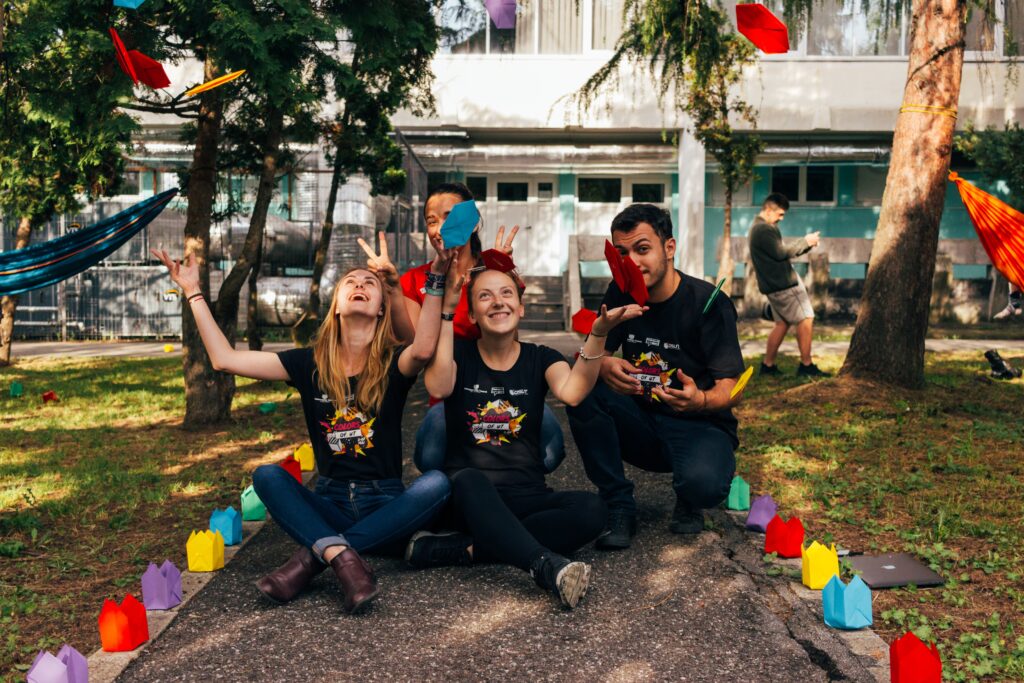Introduction
Introverts, known for their thoughtful and analytical nature, often find themselves seeking a comfortable social space that aligns with their personality. While many believe that one’s social inclination is fixed, the growing trend of introvert to extrovert transition suggests otherwise. This article aims to guide introverts in discovering activities that resonate with their unique traits, offering a smooth path to widening their social horizons 🌍✨. Whether you’re exploring new ways to engage or considering a shift in your social approach, this exploration is about finding joy and fulfillment in activities that feel right for you. 🌟🍃

The Art of Quiet Mingling: Activities for Low-Key Socializing
In the quest for social fulfillment, introverts often face the challenge of finding activities that align with their natural disposition. This first step in their journey is about recognizing and embracing their introverted qualities, which is where our advanced introvert test becomes a valuable tool. By taking this test, individuals gain deeper insights into their unique personality traits, helping them identify social settings that are likely to be more comfortable and enjoyable.
Quiet mingling, contrary to popular belief, isn’t about forcing oneself into loud or crowded spaces; it’s about discovering environments where one can interact at a comfortable pace and intensity. Activities like small book clubs, intimate coffee shop meetups, or quiet nature walks provide opportunities for introverts to engage with others in a more relaxed and less overwhelming setting. These activities allow for meaningful conversations and connections without the pressure of constant interaction or the need to be the center of attention.
Moreover, introverts often thrive in settings where they can share a common interest or passion, as it gives them a natural topic of conversation and a shared purpose. Joining a photography club, attending a writing workshop, or participating in a low-key cooking class can open doors to not only new skills and hobbies but also to new friendships and social circles. These activities offer a structured environment where social interaction is part of a larger goal, making it less daunting and more purposeful.
In essence, the art of quiet mingling for introverts lies in finding the right balance between social engagement and personal comfort. It’s about choosing activities that don’t drain their energy but rather enrich their social experience. By starting with small, interest-based gatherings and gradually expanding their social repertoire, introverts can create a fulfilling social life that resonates with their inner selves, all while maintaining their true nature.

Online Communities: Connecting from the Comfort of Home
For introverts, the digital world presents a unique opportunity to connect with others while maintaining a sense of comfort and control. Our intro to extro community is a perfect example of this, offering a platform where introverts can engage in discussions, share experiences, and learn from others who are on a similar journey. Online communities provide a safe space for introverts to interact at their own pace, without the immediate pressures often felt in face-to-face situations.
In these virtual spaces, introverts can explore a range of topics and activities that align with their interests. From forums focused on specific hobbies to general discussion boards, the internet is a treasure trove of communities where one can find like-minded individuals. For those looking to expand their social skills or explore the introvert-to-extrovert spectrum, these communities can be a source of inspiration and encouragement. Members can exchange tips, discuss challenges, and celebrate successes in a supportive environment.
Furthermore, online platforms often host virtual events such as webinars, online workshops, or live-streamed group activities. These events allow introverts to participate in group dynamics without the overwhelming stimuli of physical gatherings. It’s a unique way to experience social interaction while still having the option to ‘step away’ if needed, simply by turning off the camera or muting the microphone.
The beauty of these online communities lies in their accessibility and diversity. Introverts from all walks of life and geographical locations come together, bringing a wealth of perspectives and experiences. This diversity enriches conversations and provides a broader understanding of the introvert experience globally. Additionally, the asynchronous nature of many online interactions means that introverts can take their time to formulate thoughts and responses, a luxury not always available in real-time conversations.
In summary, online communities like our intro to extro community serve as a bridge for introverts, easing the transition from solitary comfort zones to more engaged social participation, all within a controlled and familiar digital environment.

Volunteering: Fulfillment in Helping Others Quietly
Volunteering emerges as a particularly rewarding avenue for introverts to engage socially, offering a way to connect with others through shared altruistic goals. Our intro to extro roadmap emphasizes the unique value of volunteering for those looking to expand their social boundaries. Unlike conventional social settings, volunteering focuses on the act of helping and contributing to a cause, which can be more appealing and less intimidating for introverts.
In volunteering scenarios, introverts find themselves in a position where social interaction is a part of a larger, meaningful effort. This shift in focus from socializing for its own sake to working towards a common goal can alleviate the pressure that introverts often feel in social situations. Whether it’s working in a community garden, helping at a local shelter, or participating in environmental clean-ups, these activities allow introverts to engage with others in a structured and purposeful manner.
Moreover, volunteering provides a sense of fulfillment that goes beyond mere social interaction. Introverts often report a deeper sense of satisfaction when their actions contribute to the well-being of others or the betterment of a community. This sense of purpose can be a strong motivator and can help reduce feelings of social anxiety or discomfort. The act of volunteering often requires teamwork and cooperation, which naturally fosters a sense of community and belonging – key elements in building social confidence and expanding one’s social circle.
Another significant aspect of volunteering is the opportunity it presents for introverts to develop new skills and interests. Many volunteering roles require training or orientation, which can be an excellent learning experience. Additionally, these roles can expose introverts to diverse groups of people, broadening their understanding and empathy towards different walks of life. This exposure can be invaluable in helping introverts feel more comfortable and confident in various social settings.
In essence, volunteering offers a dual benefit for introverts: it provides a low-pressure environment for social interaction and the chance to contribute meaningfully to society. By engaging in volunteer work, introverts can gently stretch their social muscles, building confidence and connections in a way that feels authentic and rewarding.

Book Clubs and Reading Groups: A Haven for Literary Introverts
Book clubs and reading groups represent a sanctuary for literary introverts, blending the love of reading with the opportunity to engage in thoughtful discussions. These gatherings are ideal for introverts, as they revolve around a structured activity – discussing a book – which provides a clear focus for social interaction. This structure reduces the ambiguity and open-endedness of typical social gatherings, which can often be daunting for introverts.
In a book club, introverts find a space where they can express their thoughts and opinions in a respectful, intellectually stimulating environment. The discussions are usually centered on the book’s themes, characters, and author’s intent, offering a safe topic for conversation. This kind of interaction appeals to the introvert’s preference for deep, meaningful conversation rather than small talk. It also allows them to prepare in advance, which can be comforting for those who prefer time to process their thoughts before sharing.
Moreover, these groups often meet monthly or bi-monthly, providing a regular yet not overwhelming social schedule. This frequency strikes the right balance for introverts, offering regular social contact without feeling draining. The predictability of these meetings also helps in managing energy levels and social commitments.
The beauty of book clubs lies in the diversity of perspectives they bring together. Participants come from various backgrounds, each bringing their unique interpretation of the reading material. This diversity enriches the discussion, providing a broader understanding of the text and the world. For introverts, this can be an eye-opening experience, as it challenges them to consider viewpoints outside their own.
Additionally, book clubs often foster a sense of community and belonging. Over time, members get to know each other’s tastes and personalities, creating a warm and friendly atmosphere. This sense of community can be incredibly rewarding for introverts, as it provides a sense of belonging and acceptance within a group.
In summary, book clubs and reading groups offer a unique blend of intellectual stimulation and social interaction that is perfectly suited to the introvert’s disposition. They provide a structured, meaningful, and regular social activity that allows introverts to engage with others in a comfortable and fulfilling way.
Fitness and Wellness Groups: The Introvert’s Approach to Staying Active
Fitness and wellness groups cater uniquely to introverts, offering a balance of solitary focus and communal support. These groups provide a structured environment for physical activity, which appeals to the introvert’s preference for organized and purposeful engagement. Whether it’s yoga classes, hiking groups, or a running club, these activities allow introverts to participate alongside others, sharing a common goal of health and wellness, without the pressure of continuous conversation or social interaction.
In such settings, the primary focus is on the activity itself, be it a yoga pose, a running trail, or a fitness routine. This focus provides a natural barrier to the overwhelming aspects of socialization, allowing introverts to engage at a level that feels comfortable for them. The shared experience of physical exertion and the pursuit of personal fitness goals create a bond among group members, fostering a sense of camaraderie and mutual respect.
Moreover, fitness and wellness activities often have a meditative or reflective component, especially in practices like yoga or tai chi. These elements resonate with the introvert’s inward-focused nature, providing a space for introspection and personal growth within a social setting. The endorphin release associated with physical activity also contributes to a positive mood and increased confidence, which can make social interactions more enjoyable and less stressful for introverts.
These groups also offer a sense of routine and regularity, which can be comforting for introverts. Knowing when and where they will be interacting with others helps them manage their energy levels and prepare mentally for social engagement. Furthermore, the non-competitive nature of many wellness activities ensures a non-threatening environment where introverts can feel at ease.
Additionally, fitness and wellness groups often lead to organic, low-pressure socializing. Conversations tend to revolve around the activities themselves, making interactions more straightforward and less mentally taxing. Over time, these interactions can lead to deeper connections and friendships based on shared interests and experiences.
In essence, fitness and wellness groups provide a unique combination of physical activity, mental well-being, and social interaction that suits the introvert’s lifestyle. These activities offer a comfortable way to stay active and socially connected, all while respecting the introvert’s need for personal space and introspective moments.
Photography Walks: Blending Art with Solitude
Photography walks, an increasingly popular activity among introverts, blend the art of photography with the serenity of solitary exploration. These walks, often organized in groups, offer the perfect balance of solitude and social interaction. Introverts, with their keen eye for detail and appreciation for the subtleties of their surroundings, find these activities particularly rewarding. Photography provides a focused task that directs attention outward, easing the social pressures that can often feel overwhelming.
On these walks, the primary activity is photography – capturing landscapes, cityscapes, wildlife, or urban details. This focus allows introverts to engage with the world through their lenses, offering a comfortable buffer between themselves and others. The beauty of photography is that it is both a solitary and a shared experience; participants can immerse themselves in their own creative process while being part of a group. This duality suits the introvert’s need for alone time within a social context.
Moreover, photography walks often occur in visually stimulating environments, be it nature trails, historic neighborhoods, or bustling urban settings. These environments provide a wealth of subjects to photograph, keeping the mind engaged and reducing the anxiety of social interaction. The act of exploring and capturing these settings can be meditative and deeply satisfying for introverts, who often enjoy observing and reflecting on their surroundings.
In addition to the personal enjoyment of photography, these walks provide an opportunity for introverts to connect with others who share their interest. Discussions tend to center around photography techniques, equipment, and compositions, which can be more comfortable for introverts than small talk. Sharing tips, experiences, and photographs can lead to meaningful interactions and learning opportunities.
Furthermore, photography walks often culminate in sharing sessions, where participants can showcase their work and discuss their experiences. These sessions provide a platform for introverts to express themselves and engage with others in a structured, low-pressure environment. The feedback and camaraderie found in these groups can boost confidence and encourage further social interaction.
Overall, photography walks offer a unique combination of creative expression and gentle social engagement. They provide a space where introverts can enjoy their hobbies, develop their skills, and gradually expand their social horizons in a comfortable and fulfilling way.
Board Games and Low-Key Group Activities
Board games and low-key group activities are increasingly popular among introverts as a means of socializing in a relaxed, structured environment. These activities are particularly appealing because they focus on the game itself, providing a natural and comfortable framework for interaction. For introverts who may find unstructured socializing challenging, board games offer a way to engage with others while having a clear focus and purpose.
The appeal of board games lies in their diverse range – from strategy-heavy games that require deep thinking and planning, to light-hearted party games that encourage laughter and casual conversation. This variety ensures that there’s something for every type of introvert, whether they prefer complex, thought-provoking games or simple, fun activities. The shared experience of learning, strategizing, and playing together fosters a sense of camaraderie and cooperation among participants.
Furthermore, board games often stimulate interesting and engaging conversations that go beyond the game itself. They can be a springboard for discussions about strategy, game design, or even broader topics, depending on the nature of the game. For introverts, this provides a comfortable way to contribute to conversations and connect with others without the pressure of small talk or personal disclosures.
These group activities also offer a sense of predictability and control, which can be reassuring for introverts. Knowing the rules of the game and having a clear understanding of what to expect from the social interaction helps reduce anxiety and makes the experience more enjoyable. Additionally, the turn-based nature of many games gives introverts the time they need to process and respond, which is crucial for their comfort and engagement.
Moreover, board game groups often meet regularly, providing a consistent social outlet. This regularity allows introverts to build and maintain relationships over time, gradually increasing their comfort and familiarity with the group. It creates a safe social space where introverts can be themselves, share in the enjoyment of a common hobby, and slowly expand their social skills in a supportive environment.
In summary, board games and low-key group activities are an excellent way for introverts to socialize in a fun, engaging, and structured setting. These activities provide a balance of social interaction, mental stimulation, and enjoyment, making them an ideal choice for introverts looking to expand their social circle in a comfortable and meaningful way.
Conclusion
In conclusion, finding suitable social activities for introverts doesn’t have to be a daunting task. From quiet mingling in book clubs and photography walks to engaging in online communities and board games, there are numerous ways for introverts to comfortably navigate social spaces. Each of these activities offers a unique blend of structure, shared interests, and the opportunity for meaningful interaction, aligning perfectly with the introvert’s preference for thoughtful, purposeful socializing.
The key takeaway for introverts is to recognize that socializing and enjoying a rich social life is entirely achievable within their comfort zone. By choosing activities that align with their interests and personality, introverts can experience the joy of social connection without the overwhelm. Whether it’s through volunteering, participating in fitness groups, or engaging in creative pursuits, there’s a niche for every introvert to feel connected, fulfilled, and socially active.
As introverts venture into these activities, they may also discover aspects of themselves that they hadn’t explored before, opening doors to personal growth and newfound confidence. The journey of expanding one’s social circle as an introvert is not just about meeting new people; it’s about self-discovery and embracing the unique qualities that make each introvert special. In embracing these activities, introverts can find not just social niches where they feel comfortable and appreciated, but also avenues for self-expression and personal fulfillment.




